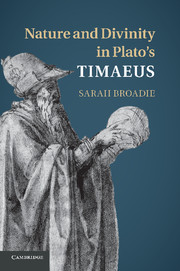Book contents
- Frontmatter
- Contents
- Acknowledgements
- What lies ahead
- Chapter 1 The separateness of the Demiurge
- Chapter 2 Paradigms and epistemic possibilities
- Chapter 3 The metaphysics of the paradigm
- Chapter 4 Immortal intellect under mortal conditions
- Chapter 5 The Timaeus–Critias complex
- Chapter 6 The genesis of the four elements
- Chapter 7 Divine and natural causation
- In conclusion
- Appendix on ‘parts of the paradigm’
- References
- General index
- Index locorum
Chapter 3 - The metaphysics of the paradigm
Published online by Cambridge University Press: 05 December 2011
- Frontmatter
- Contents
- Acknowledgements
- What lies ahead
- Chapter 1 The separateness of the Demiurge
- Chapter 2 Paradigms and epistemic possibilities
- Chapter 3 The metaphysics of the paradigm
- Chapter 4 Immortal intellect under mortal conditions
- Chapter 5 The Timaeus–Critias complex
- Chapter 6 The genesis of the four elements
- Chapter 7 Divine and natural causation
- In conclusion
- Appendix on ‘parts of the paradigm’
- References
- General index
- Index locorum
Summary
Cosmology or metaphysics?
Consider the ambiguous phrase ‘intelligible world’. In the context of Platonism it could allude to the assumption that this sense-perceptible universe may also become to some extent intelligible to us since it was made according to a rational and benevolent plan which we may reasonably attempt to reconstruct. Alternatively, the phrase may refer to an object accessible only by intellect, an object which constitutes the eternal original of which this universe is a merely temporal copy. The eternal original is called a ‘world’ (or ‘cosmos’) because the world-hood of the sensible world, which is to say its physical order and complexity-in-unity, is inherited from corresponding features of the intelligible model. A question worth pondering – even though we may have no doubt of the answer – is: which of these two ‘intelligible worlds’ is Timaeus’s monologue principally about? Is the account first and foremost about the physical cosmos and its contents, an attempt to make more sense of this subject-matter than previous cosmologies had done – but an attempt that depends for its specific shape on an underpinning in trans-natural metaphysics? Or is the account primarily about that intelligible entity in accordance with which the physical cosmos was made – does it treat the physical cosmos as the taking-off point for an investigation of that intelligible entity? To understand Timaeus’s monologue in this second way is to look upon it as a gateway through which to enter into the study of the metaphysics of the incorporeal, this being the primary object of interest.
I distinguish between these two approaches for the sake of philosophical clarification and analysis. Thus the aim is not to provide a clear-cut contrast by which to classify historical interpretations of the Timaeus. For Plotinus, Porphyry, and Proclus the world of nature is the launching pad for the soul’s ascent to the intelligibles and beyond, and these philosophers were surely more occupied with the metaphysical problem of how the intelligible manages to be reflected in the sensible and in matter, than with constructing a picture of the physical world by conjecturing the contents of its paradigm. One might therefore infer that they read the Timaeus accordingly; and broadly and impressionistically this may be plausible. But Plotinus and Porphyry are not in the business of giving an extended commentary on the Timaeus, and Proclus, who is, understands his task in a way that certainly accepts the cosmology as such even though for him there is a great deal more to it than just that; and he seems to have no uneasiness in combining these different perspectives.
- Type
- Chapter
- Information
- Nature and Divinity in Plato's Timaeus , pp. 60 - 83Publisher: Cambridge University PressPrint publication year: 2011



